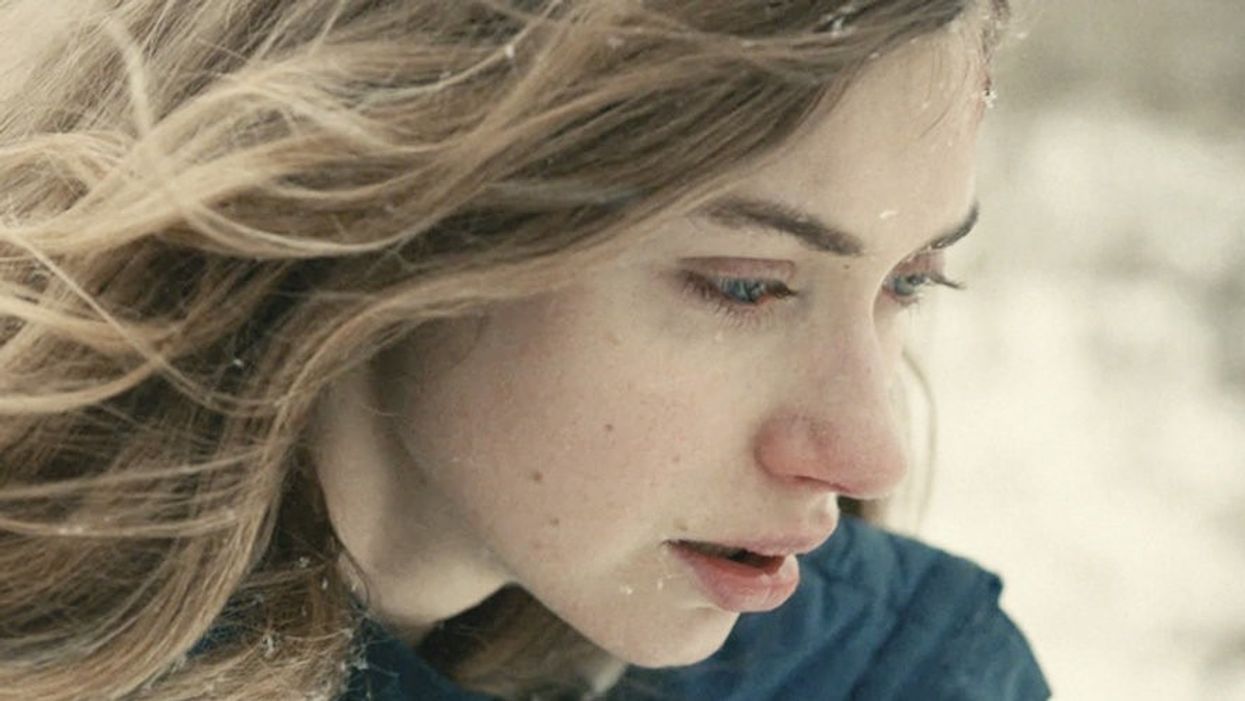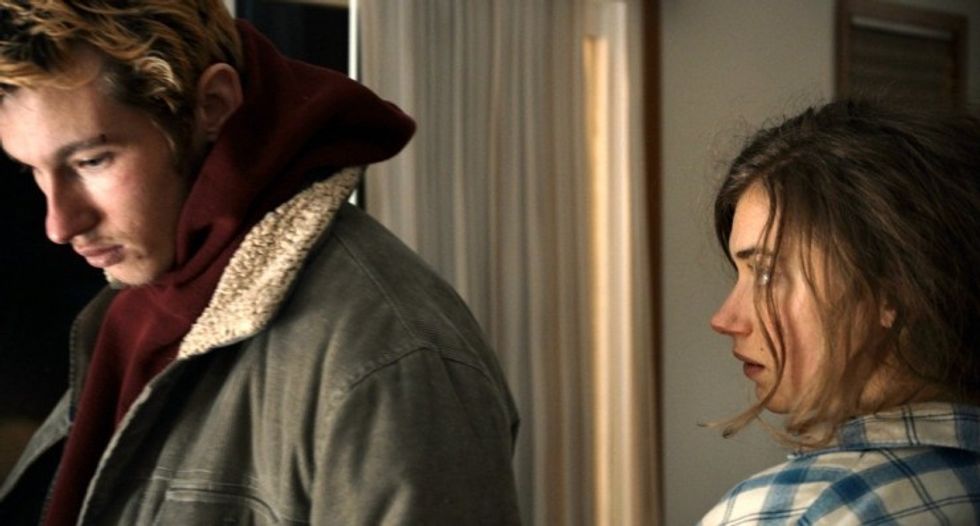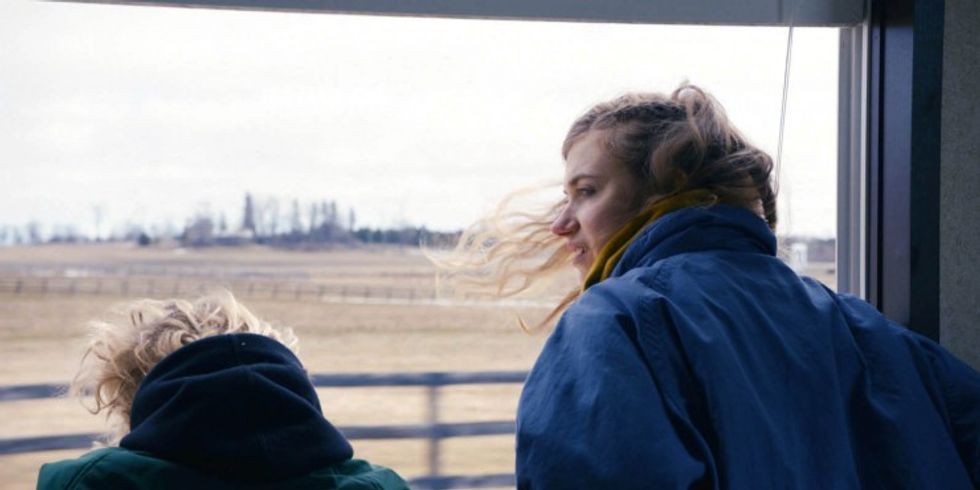From Short to Feature: 'Mobile Homes' Director Vladimir de Fontenay on Finding the Heart of Your Story
This film school student made a prominent short, but he wasn't finished there.

Mobile Homes, the debut feature of Vladimir de Fontenay is, essentially two films in one. One film is a moody tone poem, exploring the backroads of an economically depressed America; the other is a story about the power of emotional bonds between people, and the struggle to maintain them.
Its two central figures, Ali and Evan, both on the sketchy side of legality and morality, not to mention economic stability, are both bound and not-bound to each other; what holds them together is their son, Frank. We watch them drifting from locale to locale, their grasp on stability becoming more and more frayed. The film builds to its crisis point calmly, in poetic leaps; the story is made more powerful with crushing cinematography, full of the lyricism of urban sprawl.
No Film School talked to de Fontenay recently about the film’s organic development.
No Film School: I know this film was adapted from a short, and I just wanted to find out a little bit about what your process was in adapting it.
Vladimir de Fontenay: I did the short film when I was in my second year of grad school at NY, and basically it started with just an image. I was driving upstate and scouting for other friends' short films, and then I passed by a mobile home being towed by a truck. I thought it was so visually striking and so metaphorical. I just started thinking about that concept of moving homes, and how it could resonate for characters who didn't have a home, and I started writing a short film.
I made the film in my second year of school, and then it played at a bunch of festivals, and then I felt that I didn't explore enough, and I felt like I wanted to write deeper and more conflicted characters. I had a sense of empathy with them. I then started just expanding, or not so much expanding it as picking up the story where I left it. So basically the short film was very much like the first act of the feature.
Basically I was like, "Wow, they're running away in that mobile home, but what's next for them? Are they going to be able to move on with their lives and adapt and change?" That's what I wanted to explore in the feature. So it was really nice, because the writing picked up where I had left it with my short film. Obviously, I changed the beginning, but it was very intuitive. The premise was there, but then because the characters were already there, the question was, how do they interact? How do they change? What's going on next? I was very much holding the characters’ hands as they were facing all these new challenges.
NFS: You mentioned that the short film was like the first act. How did you structure the rest of the film? Did you see it as existing in sections, or sort of as one continuous story?
de Fontenay: The mobile home was very much the image, the starting point, but slowly, because when I write and when I think of stories, it's very unconscious. I'm just thinking in terms of images and feelings, and then often it's only after the fact that I think, "Oh wait, I was trying to express that feeling."
I think with Mobile Homes, what ended up being the thread throughout was the idea that this young mother only becomes a mother when she decides that she can abandon her child for him to have a better life, you know? It was just that contradiction of having the character be okay with having her child removed from her, as long as it allows the kid to have a better life. In that moment, she becomes a mother. She makes a decision that's not going to make her necessarily better off, but it's going to make her child better off. That guided the writing.
In terms of a structure, I think I wanted to show a life that was very much on the road, and then when the characters have to run away from it, just have them be still in one place. It was like a road trip that was locked up in the second act, in the idea that suddenly these characters have to be still. They have nowhere else to go, and how do they then move on if they can't move everywhere?
Tthere was also this idea that I wanted things to be reduced to the minimal. The film ends with just a closeup of two hands holding each other. Home, for these characters, means so many things—mobile homes with an "s," you know? The bond between them is really their home.
NFS: One thing that makes the film so powerful, to me at least, is the authenticity of it. I was wondering what kind of research you did into, for instance, mobile homes themselves, or cockfighting, for example?
de Fontenay: Usually when I think of a story, it starts with real life. In the case of Mobile Homes, it started really just with the vision of that moving house. The first phase is really not to do research at all, to be removed from reality, so that I can think of the movement of the characters and what it is that I want to express.
Once I have a little bit of a structure of the film, or a little bit of the structure of how I want it to move and work as a movie, then I do a lot of research, because obviously, you don't want anything to feel forced. Even if it's fiction, you want it to be grounded in reality, and you want it to be grounded in real life. I did a lot of scouting in mobile home parks. I went to a bunch of mobile home factories, and I met also a lot of social workers. What's really great is that the shooting of a movie de facto forces you to confront fiction with reality, because when it comes to the choice of the location, the choice of the costume, the choice of the sound design, all these little things force you to do research.
What happened with, for example, the cockfight, was that I was introduced to the son of someone who has a cockfighting ring in Thailand. Through the animal wrangler, we got to meet people who had underground cockfighting rings in different parts of this country. I also watched a lot of YouTube videos, and I read a lot about police busting up cockfights. It's really just, for me, a matter of being as informed as I can so that it's grounded in reality, but then also freeing myself from it so that we're still telling a story, and I'm not doing a documentary, and I'm not making a photograph of what it is for these young people to survive in that world. That movie is really the story of these characters, this young mother.
"When I write and when I think of stories, it's very unconscious. I'm just thinking in terms of images and feelings, and then often it's only after the fact that I think, "Oh wait, I was trying to express that feeling."
NFS: One other question I have has to do with the actor who plays Frank in the movie. I was curious how you worked with him to develop the character because he is really, really strong, and it's a really great performance.
de Fontenay: What happened is when we started the casting, we auditioned a lot of kids, but I had the intuition that we needed a kid who had never acted before, and also I thought, because most of the actors were professionals, I thought the kid could really be just a kid who didn't have acting experience. But my intuition also told me that we needed a kid who had a certain level of ability with animals.
We started scouting and looking for kids in farms because I thought, "Well, in a farm, it's very close to adult work. They're also helping with general work, or they're exposed to the animals, so they'll be comfortable." When I met Frank, he brought a rooster to the audition, which I thought was really cool. He said he had 500 roosters at his farm. For me, it was very important that he was comfortable with the animals.
I also liked the idea that he lived in a very remote place in Nova Scotia, so he wasn't a city kid. He had a lot of imagination and he would travel in his mind a lot, and I thought that was really good because the kid in Mobile Homes is so often left alone and so often having to deal with adult situations that he doesn't necessarily understand. I thought he had these resources in himself to self-entertain or to have fun. These were things I knew he would be able to pull off.
"I try to have as much information in the script as possible."
I also got a chance to work with this woman who trains young kids who have been sort of left out of schools or come from very difficult backgrounds. What she did with Frank was help him tap into one side of his brain to learn certain lines or elements of the script, but without getting him to know them by heart. Then I started prepping with them, and I started to work with him on set.
I would leave him a lot of freedom. I would always be really flexible with little accidents because obviously there were kids, water, animals. But the camera was handheld or on Steadicam, and I had very loose blocking. I always told the actors that if the lines didn't feel right because the little kid is doing something else, it doesn't matter. Go with the kid, you know?
A lot of the time, Frank was just being himself in an environment where he had to be a little looser, or he had to react to Alan Turner being his father, you know, sort of like the silent father figure, and being fun and motivating him. We created an atmosphere in which he could just be himself. But then during the filming, we really saw him emerge as an actor.
NFS: What was your dialogue like with Imogen Poots when you were developing the character with her?
de Fontenay: First I started sharing a lot of things with her. I would share with her a lot of photographs or things that, for me, were evocative of the character's life more than the character herself. For example, the work of Jim Goldberg or the work of Brenda Ann Kenneally, following young adults struggling in their daily life, reaching that level of intimacy with them. I sent a lot of photos that I felt would help her create the character.
I try to have as much information in the script as possible, as much documentation that I can send, so even stuff about the cockfight and portraits of people like, Mary Ellen Mark or Brenda Ann Kenneally would do. I would send it to Imogen, and then we'd talk a little bit about the part in the context of the scenes. I don't want to get too much into the psychology of the character. I'd rather be in the moment and the action.
It would really be a conversation between the two of us in the moment based on the context of the scene more so than a completely made up character that we'd have built from scratch. Because there's also a level of freedom that I leave to the actors, where I want also them to take possession of the character. I put little indications in the choice of the costume, or in the choice of the location, or the kind of clothes that she'd be wearing in a certain scene, that I think might help the actor.
For example, she knew Callum Turner before, and so they had a certain level of intimacy between the two of them, like they were friends. For example, in the dialog, even in their nicknames, the way they would call each other. I told them, "It's all yours. We're going to be filming you. Even the way you call each other. It's something that you can invent. If it comes more naturally to call him the way you would call him, do it."
I was more interested in making it authentic and feeling real than an idea of a character or an idea of the dialogue. I was very, very flexible about certain things, and then on the other hand in terms of the direction of the scene, I knew where I was going.
So Imogen would create the character, and I would be very open to her suggestions. Then I would make mine, and that's how it worked on set.













